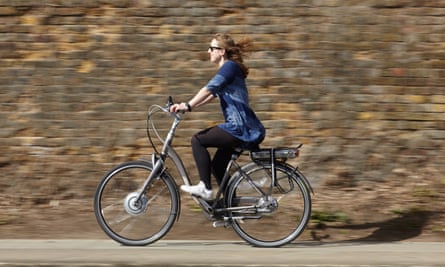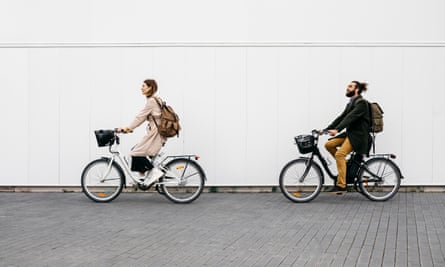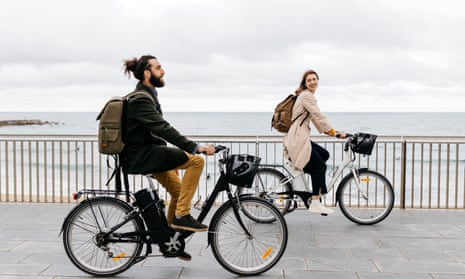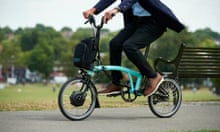When Ben Longdon’s son got too heavy for him and his wife, Laura, to manage on the back of their bikes on their hilly Cornish commute, it looked as if they might have to start using their car. Instead, they hit on another solution – an e-bike. In non-lockdown times, Ben and Laura work at the University of Exeter campus about three-and-a-half miles from their home in Falmouth, and their children – they now have another son – attend the on-site nursery.
Most days, the family commute together. Ben rides a conventional bike, with Laura on the e-bike, pulling a trailer in which the two boys sit. “I can just about keep up on the flat if there’s not a headwind,” he says. “But she beats me up the hills. She can beat people wearing Lycra up the hills, even with the kids on the back. She normally waits by the entrance to the campus so I can have a drink of water and catch my breath.”
The family still have a car, but drive it less than they used to, often using the e-bike for shopping. With their older son about to start school, they have ordered a second one. “I was a little sceptical when we got the first one, but we’ve used it loads,” Ben says. “You can think of it more as a car replacement than as a bike.”

Across the country, there are a lot of people who, in the coming weeks, are likely to start thinking along the same lines. With some people starting to tentatively return to work, but with physical distancing slashing capacity on public transport, the idea of bikes for everyday transport is suddenly big news.
Many in the cycling world are wondering if this could be the moment when e-bikes, which are hugely popular in some other European countries (about 40% of bikes sold in the Netherlands are e-bikes), could take off in the UK as well.
Manufacturers and shops say demand has rocketed. Halfords, the UK’s biggest bike retailer, won’t give details, but says e-bikes account for 11% of sales. Jonathan Cole, who runs a London-based mini-chain of bike stores, Velorution, says demand for e-bikes has been “off the scale” in recent weeks.
So, could an e-bike be the answer for your post-lockdown commute? There are a few things to bear in mind, not least what exactly we’re talking about. An e-bike is a type of bicycle that can be used without any licence, mandatory insurance or helmet, and taken on bike paths. To avoid being classified as a moped, it must fit very specific criteria. The electric motor, limited to 250w, can assist propulsion only when the rider pedals. The maximum powered speed is 15.5mph. And riders must be 14 or over.
E-bikes in various forms have been around for decades, but early versions could be clunky, unappealing and oddly balanced. Now, they are generally smooth and easy to ride, with sufficient power to let you glide up even steep hills with ease.
Particularly on higher-end models, the motors tend to be effective enough to help propel bikes laden with shopping and children. And there are three-wheeled cargo-type machines, which have large bays for baggage or children.
The flexibility of e-bikes means they are seen as more likely to tempt some people away from using their cars. As well as the carrying capacity, the motor boost on hills allows you to wear work clothes and still arrive at work sweat-free. Improved battery technology means effective ranges of several dozen miles or more between charges. E-bikes are also appealing to a potentially broader group of riders, including older people or those working towards more fitness, as well as people with impairments or disabilities.
I asked via Twitter for people to get in touch to say whether they used an e-bike, or were thinking about getting one, and a reasonable proportion of those who responded cited problematic knees, chronic conditions or other issues. But a lot simply said an e-bike meant they rode more often, or were happy to tackle a commute that previously they only did in a car. Laura, a 28-year-old project manager, used her car for a six-mile commute across north Sheffield, but now only does so when it rains.
“I’m not going to pretend that I’ve completely changed and I’m never using the car, but I’m using it less,” she says. “But commuting on the e-bike is much less stressful. In the car, you get stuck in traffic, and parking around my work is very difficult most days. Instead, I can just glide through a lot of traffic.”
There is, however, a residual feeling among many British cyclists that e-bikes are somehow cheating. And with an estimated 100,000 deaths a year in the UK because of physically inactive lives, it is a valid worry. Commuting on a traditional bike has been proved to be astonishingly good for people’s health, whereas e-bikes do a lot of the strenuous work. However, the good news is that studies have shown people do still exert themselves.

One 2019 research paper, which tracked 10,000 people across seven European cities, found those who rode traditional bikes and e-bikes amassed roughly the same amount of physical activity, with the impact of the electric assist cancelled out by the fact that those on e-bikes tended to ride longer distances and more often.
Ashley Cooper, a professor of public health at University of Bristol, says that in terms of helping people to be more active, e-bikes are “probably the best physical activity intervention I’ve done”. He led a project where a group of people with type 2 diabetes were loaned e-bikes, with their heart rates monitored. He says: “It’s not a no-exercise option. It’s a really great way of getting moderate-intensity activity.”
Because e-bikes go no faster than many cyclists, at 15mph, there is no indication that they are more dangerous than other bikes. The issues, where they arise, can be that other cyclists or drivers don’t expect a clunky-looking bike to start off so fast. Which may be what has led to the phenomenon of the “e-bike smile”, when cyclists first try one – it’s like having a permanent tailwind. Londoners can try out the e-bike share schemes, such as Lime and Jump, to see if they suit.
But now for the downsides. The first is the cost. This can be as little as £400, but better models tend to be well over £1,000, with cargo bike variants more than double this. E-bikes are eligible for the tax-saving cycle-to-work scheme, but are not included in the system of government grants of up to £3,000 towards the costs of an electric car or moped.
Among those who would like this changed is Sarah Storey, the multi-medal winning Paralympic athlete who is a campaigner on everyday cycling for British Cycling and active travel commissioner for the Sheffield city region. Storey argues e-bikes should, if anything, be eligible for even bigger grants: “Why should an e-car attract a greater level of subsidy? It’s still a very inefficient use of space. If you’re giving up your car, you almost need a bonus – get it paid for and get £500 to say: ‘Thank you very much, you’ve made a massive difference here.’”
The other issue is storage. For people living in flats, secure bike storage can be a problem, but the weight of e-bikes make them harder to carry up stairs, and their value means locking them on the street is risky. Foldable e-bikes do exist, with some manufacturers reporting particularly heavy demand.

The biggest barrier in the UK is cyclists feeling unsafe on the roads. In places such as the Netherlands and Denmark, riders of e-bikes, as well as of any other bike, enjoy the fruits of decades of work to make roads safe for cyclists. Now such countries are braced for a further e-bike boom. The European Cycling Federation says that, Europe-wide, e-bike sales grew 22% year on year in 2019, and are expected to rise much faster this year.
Klaus Bondam, head of the Cyklistforbundet, Denmark’s main cycling campaign group, says the country is expecting an increase in ridership numbers as people are urged to avoid public transport – and seek exercise to shed what he calls “corona-kilos” acquired in lockdown. “There’s been an increase in sales of e-bikes in Denmark, and also e-cargo bikes, as a lot of families are using them as the primary means of transportation,” he says.
The same idea could be appealing to many Britons, but whether or not they go ahead could depend on how effectively councils use newly acquired powers to rapidly create cycle lanes.
Storey says the one thing stopping her buying an e-bike as family transport for her two small children is safety: “I would, absolutely, use an e-cargo bike to go to the supermarket, and I know my husband would. But only if there was segregated infrastructure and it was safe to do so.”











Comments (…)
Sign in or create your Guardian account to join the discussion